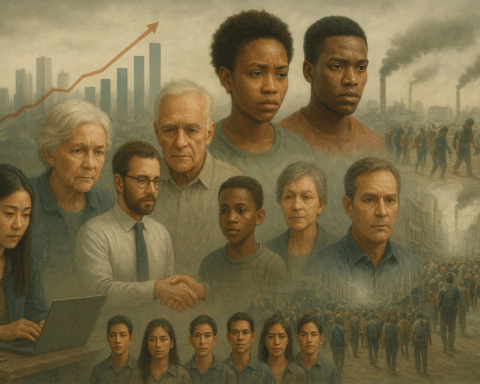The convergence of aging and urbanization constitutes an existential tremor that penetrates the very foundation of market economies, institutional decision-making, and societal stability. What may initially appear as mere demographic shifts reveals itself, upon closer examination, as a catalyst for the structural redistribution of power, capital flows, and ethical norms across both public and private domains. In boardrooms where the temperature of compliance and reputational risk is constantly measured, this dual dynamic is no longer an abstract trend but an all-defining reality that rewrites the contours of corporate governance. The aging population redefines consumption through its emphasis on security, health, and sustainability; the urbanizing population restructures infrastructure through its demand for speed, connectivity, and energy efficiency. Within this labyrinth of opposing interests and converging urgencies lies the danger of strategic blindness—a peril that, under the gaze of regulators and shareholders, can easily metastasize into accusations of financial mismanagement, conflicts of interest, or even corrupt manipulation of policy processes.
The institutional elite grappling with these dynamics now inhabits a moral no man’s land where the boundaries between innovation and manipulation, between progress and self-enrichment, are perpetually blurred. The aging society is not merely a demographic fact but a moral mirror: how are the interests of vulnerable generations safeguarded in markets where capital is fluid but ethics are sluggish? Simultaneously, rapid urbanization amplifies the risk of policy asymmetry, where public infrastructure projects lose their legitimacy under the shadow of procurement fraud and money-laundering schemes. The upper echelons of corporate hierarchies face an unflinching truth: the limits of corporate responsibility have become porous, and every misstep—no matter how trivial—can ignite allegations of deceit, sanction violations, or abuse of power.
The Demographic Erosion of Trust
Aging is not a passive demographic wave but a structural relocation of economic power and moral capital. As populations grow older, economic momentum shifts from expansion to consolidation. The consumption behavior of older generations is marked by caution, loyalty, and a demand for transparency—values that often stand in stark contrast to the opportunism of short-term profit maximization still reigning in certain boardrooms. The pressure to preserve margins in contracting markets tempts some corporations toward creative accounting, risky derivatives, or opaque joint ventures with shadowy foreign entities. Where governance fails, the soil becomes fertile for accusations of financial misconduct and breaches of fiduciary duty.
The psychological dimension of aging reveals itself equally in the capital markets. Older investors demand stability, prompting corporations to overstate profitability or downplay risks in their disclosures. Yet a subtle distortion between truth and presentation can prove fatal: a single audit report, one leak, or one revelation can demolish a reputation built over decades. In this landscape, integrity ceases to be a virtue and becomes a weapon—an instrument of survival against allegations that profit has been elevated above responsibility.
The structural aging of societies also forces governments to undertake radical reforms of healthcare systems and pension funds, causing public and private resources to inevitably intertwine. The line separating public accountability from private gain thus becomes dangerously thin. Where policy advisors, consultants, or financial intermediaries act as bridges between government and business, the temptation of conflict of interest looms large. A policy document may become a smokescreen, an investment vehicle a laundering mechanism, and a public-private partnership a theater of staged transparency.
The Urbanization of Power Networks
Urbanization is not merely the migration of people—it is the concentration of power. The city emerges as the epicenter where capital, data, real estate, and political influence collide within a dense fog of competing interests and covert transactions. Within this urban crucible, a symbiosis develops between public administration and private enterprise, where tenders, land sales, and infrastructure investments are frequently shrouded in strategic reciprocity. Allegations of bribery, fraud, or manipulation of procurement processes are therefore not isolated legal aberrations but symptoms of a deeper erosion of administrative discipline.
The concentration of economic activity within urban centers also attracts the scrutiny of international sanctions regimes and compliance authorities. Real estate transactions, energy contracts, and mobility infrastructure projects provide fertile ground for money-laundering and opaque investment practices. In such a context, a single lapse in due diligence, a single sham transaction, can be construed as complicity in sanction evasion or even financing of corrupt regimes. Urbanization renders power visible, yet simultaneously expands the shadow in which that power can operate.
Moreover, the expansion of cities creates a new hierarchy of economic dependencies. Technology firms, construction consortia, investment funds, and municipal policymakers become entwined in webs of mutual interest where transparency is often the first casualty. When profit margins and political agendas intersect, ethics become negotiable. And where ethics become negotiable, the road to legal exposure and reputational annihilation lies open.
The Shifting Culture of Consumption
Aging and urbanization together reshape the terrain of consumption into a hybrid form of materialism and moral consciousness. Older generations crave security, comfort, and integrity; younger urbanites demand speed, innovation, and social relevance. Corporations that fail to comprehend this duality risk not only market share but moral credibility. In markets where reputation is the new currency, an allegation of deception or fraudulent marketing can prove catastrophic.
Consumer behavior in aging and urbanized societies is increasingly driven by data-driven strategies, where privacy and ethics often yield to profit optimization. As personal data becomes tradable, the boundary between consumer insight and manipulation dissolves. The careless or unethical exploitation of such data can spiral into legal escalation, as accusations of data abuse or systemic fraud open the door to sanctions and collective litigation.
Simultaneously, these evolving consumption dynamics have resurrected the demand for authenticity. Corporations that treat social responsibility as a cosmetic exercise risk exposure. The façade of sustainability and inclusivity cannot withstand the scrutiny of regulators or investigative journalists. Transparency is no longer a compliance requirement but a moral litmus test.
The Imperative of Ethical Leadership
In this environment, leadership is not a matter of strategy but of moral architecture. The C-suite operates in an arena where every decision, every statement, every document may be weighed on the scale of integrity. The complexity of demographic and urban transitions demands a form of governance that transcends rhetoric and manifests in verifiable accountability. When accusations of financial misconduct, corruption, or money laundering arise, it is rarely the incident itself that destroys an institution—it is the culture that allowed it to happen.
Ethical leadership entails more than adherence to regulations; it requires the restoration of trust as the cornerstone of economic order. In an era where regulation is expanding with exponential speed—from ESG obligations to international sanctions regimes—compliance must be seen not as an administrative burden but as a strategic lever. Enterprises that grasp this truth will not only dominate markets but serve as moral anchors in an age of cynicism and distrust.
The future belongs to those who possess the courage to confront the unspeakable. Not through moralizing, but through action—guided by a precise awareness of responsibility toward shareholders, society, and the rule of law. For where power and morality part ways, the seed of accusation is sown. And where accusation takes root, legitimacy withers—irreversibly, and without mercy.









